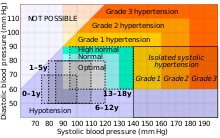Exploring the Root Causes of Elevated Diastolic Blood Pressure
 Diastolic blood pressure is an important indicator of cardiovascular health. When the diastolic blood pressure is consistently elevated, it can be a sign of an underlying health issue. In this blog article, we will dive deep into the root causes of elevated diastolic blood pressure and explore the various factors that contribute to this condition.
Diastolic blood pressure is an important indicator of cardiovascular health. When the diastolic blood pressure is consistently elevated, it can be a sign of an underlying health issue. In this blog article, we will dive deep into the root causes of elevated diastolic blood pressure and explore the various factors that contribute to this condition.
Understanding Diastolic Blood Pressure
Before we delve into the root causes, let’s first understand what diastolic blood pressure is. Diastolic blood pressure is the lower number in a blood pressure reading and represents the pressure in the arteries when the heart is at rest between beats. A normal diastolic blood pressure reading is typically around 80 mmHg. When this number consistently exceeds 90 mmHg, it is considered elevated.
Root Causes of Elevated Diastolic Blood Pressure
Sedentary Lifestyle
A sedentary lifestyle, characterized by a lack of physical activity, is a major contributor to elevated diastolic blood pressure. When we lead a sedentary life, our cardiovascular system becomes less efficient at pumping blood, leading to increased pressure in the arteries.
Poor Diet
A diet high in sodium, saturated fats, and processed foods can contribute to elevated diastolic blood pressure. Excessive sodium intake leads to water retention, putting additional strain on the heart and blood vessels. Similarly, saturated fats and processed foods can lead to inflammation and arterial stiffness, further elevating diastolic blood pressure.
Chronic Stress
Stress has a significant impact on our cardiovascular health. Chronic stress can lead to the release of stress hormones, such as cortisol, which can constrict blood vessels and increase blood pressure. Additionally, stress often leads to unhealthy coping mechanisms like overeating or excessive alcohol consumption, both of which contribute to elevated diastolic blood pressure.
Obesity
Obesity is a major risk factor for various cardiovascular diseases, including elevated diastolic blood pressure. Excess body weight puts strain on the heart, leading to increased blood pressure. Additionally, adipose tissue releases inflammatory substances that further contribute to high blood pressure.
Conclusion
Elevated diastolic blood pressure is a condition that should not be taken lightly. By understanding the root causes of high diastolic blood pressure, we can take proactive steps to prevent and manage it. Adopting a healthy lifestyle, including regular exercise, a balanced diet, stress management techniques, and maintaining a healthy weight, can go a long way in maintaining optimal diastolic blood pressure levels.
